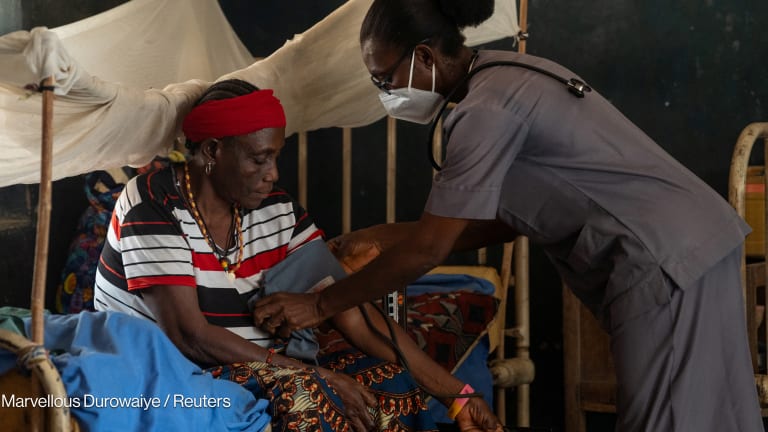
LONDON — We haven’t yet sat down with our coffees, but Richard Darlington is already full of ideas.
He is flicking through his phone to find the Christian Aid advertisement he saw that morning on the train into London. It is the latest example of how smart NGOs have become with their communications, he enthuses. Darlington’s words tumble out excitedly: The #Standtogether ad offers an optimistic image of solving problems; it uses a striking photo and a simple hashtag to “engage the agency” of the viewer; and it tells a compelling story about aid, rather than simply asking for money.
Storytelling at NGOs is typically focused on attracting funds - but there are many reasons to tell a story, and many ways to do it. Devex spoke to experts to find out how nongovernmental organizations can develop more creative storytelling strategies with impact that extends beyond donations.
His enthusiasm isn’t so surprising. Darlington has spent more than a decade thinking about exactly these themes. He was a special adviser at the United Kingdom’s Department for International Development during the last Labour administration, where he specialized in working with the media. That job was sandwiched between several stints as head of news at Britain’s leading center-left think tank, the Institute for Public Policy Research. He then spent three years in Nairobi, helping aid organizations across Africa hone their communications strategies. Now back in Britain, he is heading up a campaign bringing together more than two dozen development NGOs to talk about aid and global poverty.
Finally seated with our coffees, he talks about where, in the past, the aid sector went wrong in communicating its work, and what it can do now to reconnect with a skeptical public.
Leaving a vacuum
When he started his role as DFID special adviser in 2008, Darlington admits he had no detailed knowledge of the aid sector. His background was in the union movement and then as an adviser on education. He even admitted during his job interview with Labour Member of Parliament Douglas Alexander, then just the fourth secretary of state in DFID’s history, that he “didn’t actually know anything about international development.”
Once he was in, the ignorance didn’t last long. “You get to DFID and you go native so fast,” Darlington says. He recently wrote that the DFID minister has “the best job in government” and is full of praise for the officials who instilled this passion in him so quickly.
“Now is the time to come out and make the case again and explain what [aid]’s for, why we do it, why it’s still worth doing.”
— Richard Darlington, communications adviserDarlington’s job focused on telling the story of DFID’s work to voters and the outside world. Today, the development sector faces a running battle to justify itself to a skeptical press and public, and he acknowledges that the department did too little back then to address concerns about aid spending.
“I think those concerns were real, in sections of the public, when I was at DFID. But no one at DFID took them seriously,” he says, apart from the minister and his political advisers. His team “were acutely aware of public concerns, we were all about that,” Darlington continues, but many civil servants “just didn’t take it seriously.” Even as DFID’s spending grew — from around £2 billion ($2.69 billion) in 1997 to more than £8 billion in 2010 — there was no proactive strategy to explain where the money was going and how it benefited both Britain and lower-income countries.
Poor communication with the public meant that popular support for aid was always precarious, even as campaigners scored big wins. Thinking about landmark moments such as the 2005 Make Poverty History campaign and the 0.7 percent spending pledge that followed, “you could say that those gains are at risk now,” he said.
“We left a vacuum. We didn’t keep making the case. We banked those incredible gains and wins. We are where we are, but now is the time to come out and make the case again and explain what it’s for, why we do it, why it’s still worth doing.”
Darlington has taken a lead role in making that case, but he is also quick to credit DFID for improving its strategic communication, especially the speed with which it now rebuts misleading tabloid headlines. The DFID communications team is “way better than when I was there,” he says. “Now, boy do they take it seriously, and that is a good thing. I just think this administration is much more alive to [public concerns], in a way it wasn’t in DFID officials’ minds as they went to work 10 years ago.”
Darlington’s time at DFID ended with the change of government in 2010, but he argues that even during his relatively short time there, the department expanded its vision for what aid money could achieve.
Under Alexander, DFID moved away from its focus on service delivery and toward more ambitious plans to ameliorate the effects of war and economic failure.
“At the end of the day, if you want to end global poverty and you don’t want aid to last forever — and these are two things I feel very strongly about — economic development is the only game in town,” Darlington says, adding that DFID also shifted its focus toward improving bilateral relations.
Even if the communications strategy lagged behind these shifts in policy, the department he left was very different from the one he had found. Today, the communications team are “incredibly good at what they do,” he repeats. But there is no mistaking the sense that the department is scrambling to make up lost ground.
A new way of working
When Darlington moved to IPPR, his work took in new development ideas, including substantial research conducted with the Overseas Development Institute into how voters understood aid and development. The project was precisely the rude awakening for the aid community he had anticipated: It showed that public support for aid was waning in the absence of a clear narrative to support it.
In 2013, Darlington established WonkComms along with two colleagues. Through a series of seminars and blogs, it brought together a loose collection of think tank and charity professionals to plan modern NGO communications together. Old-fashioned press releases and press conferences were jettisoned, replaced by bite-sized social media campaigns and an eye for the news priorities which might help a story take off. It was an approach that encouraged charities to communicate their ideas quickly and effectively to a wide audience, but it also gave journalists what they wanted: Compelling stories about important issues, with some data to back them up.
Yet Darlington was still looking for a chance to tell positive stories about the importance of aid from the ground. His next stop was Well Told Story, a research and communications consultancy based in Nairobi, which works with NGOs across the continent. He became head of strategic communications in 2015 and moved his young family to live in the Kenyan capital.
Darlington ended up helping to build communications strategies for development projects in nine African countries, the majority of which were DFID-funded.
“DFID brought in this requirement that everything they fund must have a communications strategy,” Darlington explains. “I am sure there were consultants out there who just went around and wrote documents for people which then sat on shelves and gathered dust, so that in a compliance sense DFID could tick ‘Yes, you have a communications strategy’.”
He was determined to do things differently, closer to the WonkComms model. “The purpose of a communications strategy is to change the way the organization communicates,” Darlington explains, “not to codify what the organization did in the past.” Good communications should be ambitious and future facing: NGOs should ask themselves where they stand “in the market of ideas,” he says.
So he immersed himself in the projects, designing new communications plans alongside existing staff and training up new communications professionals. His strategies continued to evolve long after he had left: NGOs “picked them up and ran with them,” he says.
Settled back in Britain, Darlington is bringing these skills to a new job based at Bond, the umbrella organization for development NGOs. The Campaign for Aid connects 25 of the largest NGOs to make the case for how development work can tackle global poverty.
Darlington is under no illusions about how tricky it is to bring so many partners together. “Working together does have an additional cost, a transaction cost,” he says. “Whatever the motivation ... once you start to work together, things just do take longer. It is just harder.”
But the Campaign for Aid has big goals: To make sure the U.K. government maintains its 0.7 percent pledge for aid spending, and that DFID isn’t swallowed up by the Foreign & Commonwealth Office — a risk that has been mooted occasionally in recent times. Darlington will be leading the fight to save the department he remembers so fondly.
Our coffees are finished, and Darlington has another meeting to get to, advising a charity on their communications strategy. We walk together to the venue, and he frowns. The charity’s logo or name is nowhere to be found outside their building, despite an expanse of space. He makes a note to tell the charity about the importance of branding. The day’s ideas are still flowing.
Search for articles
Most Read
- 1
- 2
- 3
- 4
- 5








